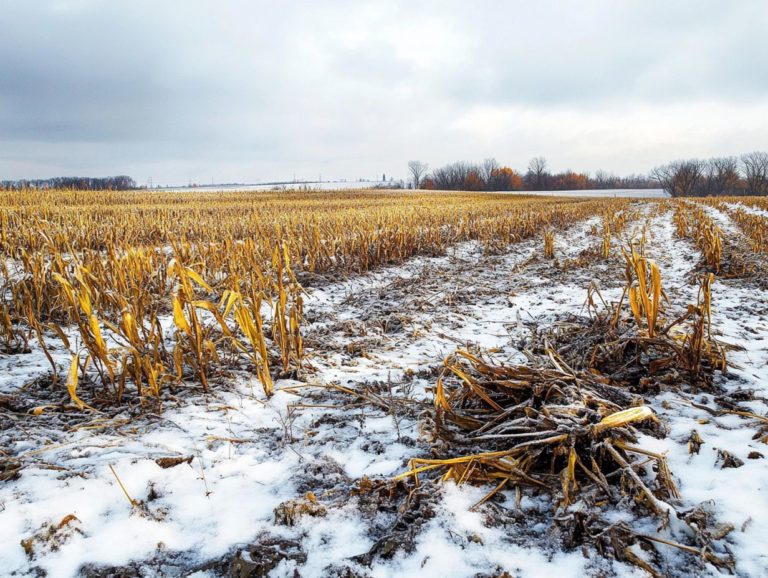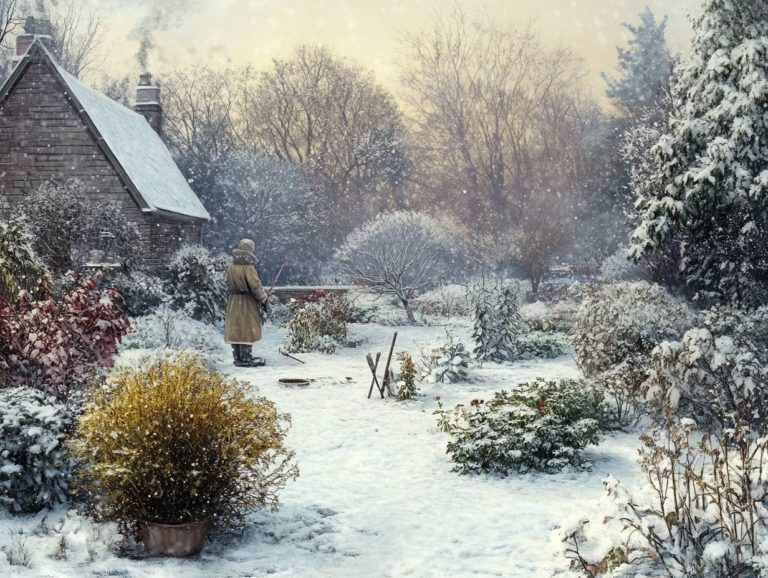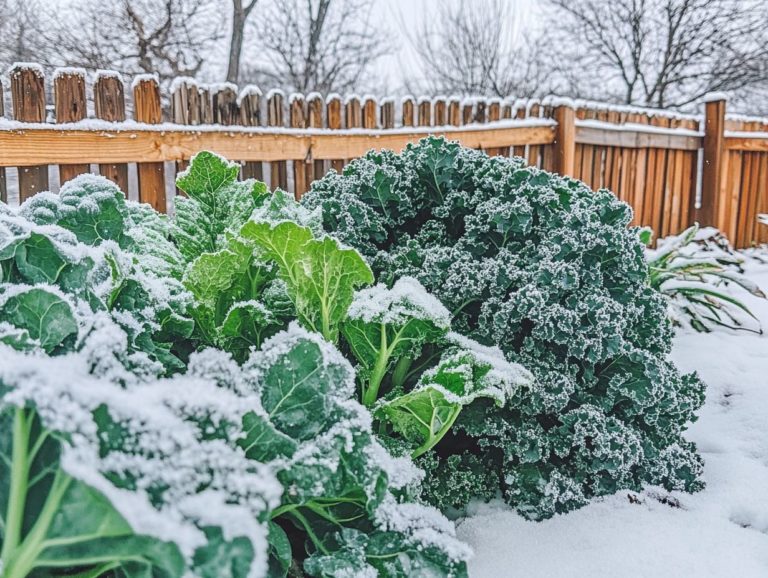How to Deal with Insects in Winter Gardens
Winter gardens can serve as a serene retreat; however, they often attract unwelcome guests: insects. As part of a vibrant community garden, understanding these pests is essential for maintaining your thriving indoor oasis. This article delves into what winter gardens are, highlights the common insect invaders you may encounter, and presents effective prevention strategies to keep them at bay.
Discover effective non-toxic treatments to tackle infestations, along with best practices to ensure your garden remains healthy throughout the year. Learn how to keep your winter sanctuary both pest-free and flourishing!
Contents
- Key Takeaways:
- What are Winter Gardens?
- Common Winter Garden Insects
- Preventing Insect Infestations in Winter Gardens
- Treating Insect Infestations in Winter Gardens
- Maintaining a Healthy Winter Garden
- Frequently Asked Questions
- How can I prevent insects like aphids and squash bugs from invading my winter garden?
- What are some common insects that invade winter gardens?
- Are there any natural ways to deal with insects in winter gardens?
- How should I handle an insect infestation in my winter garden?
- What are some signs of an insect infestation in a winter garden?
- How can I protect my winter garden from insects?
Key Takeaways:

- Keep your winter garden healthy by regularly cleaning and removing plant debris.
- Practice crop rotation, which means changing the types of plants you grow each season, to avoid insect infestations.
- Use natural and non-toxic methods, such as neem oil, diatomaceous earth, and companion planting, to effectively control and prevent insect infestations.
- Identify and understand common winter garden insects to better target and treat infestations. Regularly check your plants for signs of pests to catch and treat any issues early on.
What are Winter Gardens?
Winter gardens are exquisite outdoor spaces designed to flourish in the colder months. They serve as seasonal showcases of beauty and as vital habitats that support a variety of plants and animals.
To attract more wildlife and pollinators, consider introducing additional flowering varieties. You can enhance these gardens by incorporating overwintering insects and a variety of winter plants, such as Calendula and Rosemary.
By employing techniques like composting leaves and managing plant debris, you can cultivate a nurturing atmosphere that fosters a healthy ecosystem, even as temperatures drop.
Common Winter Garden Insects
In your winter garden, a diverse array of insects think ladybugs, bees, and dragonflies plays essential roles in upholding the garden’s health and productivity.
These beneficial insects, such as ground beetles, lacewings, and ladybugs, are key players in effective pest control. They work diligently to keep troublesome species like aphids and squash bugs at bay, even as winter settles in.
Identifying and Understanding Pests
Identifying and understanding pests in your winter garden is crucial for effective pest control. Additionally, identifying beneficial insects in winter can help maintain your plants’ vitality against common culprits like aphids, squash bugs, and wasps that pose a significant threat.
By recognizing these threats early, you can implement strategies that safeguard beneficial insects. Plus, you may encounter whiteflies, spider mites, and mealybugs during the winter months.
Learning to identify their telltale signs such as sticky residue on leaves or small webs will aid in early detection. Understanding their life cycles and behaviors can help you develop effective prevention tactics, including the use of winter washes.
Supporting a diverse ecosystem can be as simple as incorporating beneficial weeds like Crocus and Snowdrop, which provide habitat for predatory insects. Insect hotels can also serve as cozy retreats for helpful pollinators and natural pest controllers.
By nurturing these positive elements, you can maintain a harmonious garden atmosphere, even amid winter s chill.
Preventing Insect Infestations in Winter Gardens
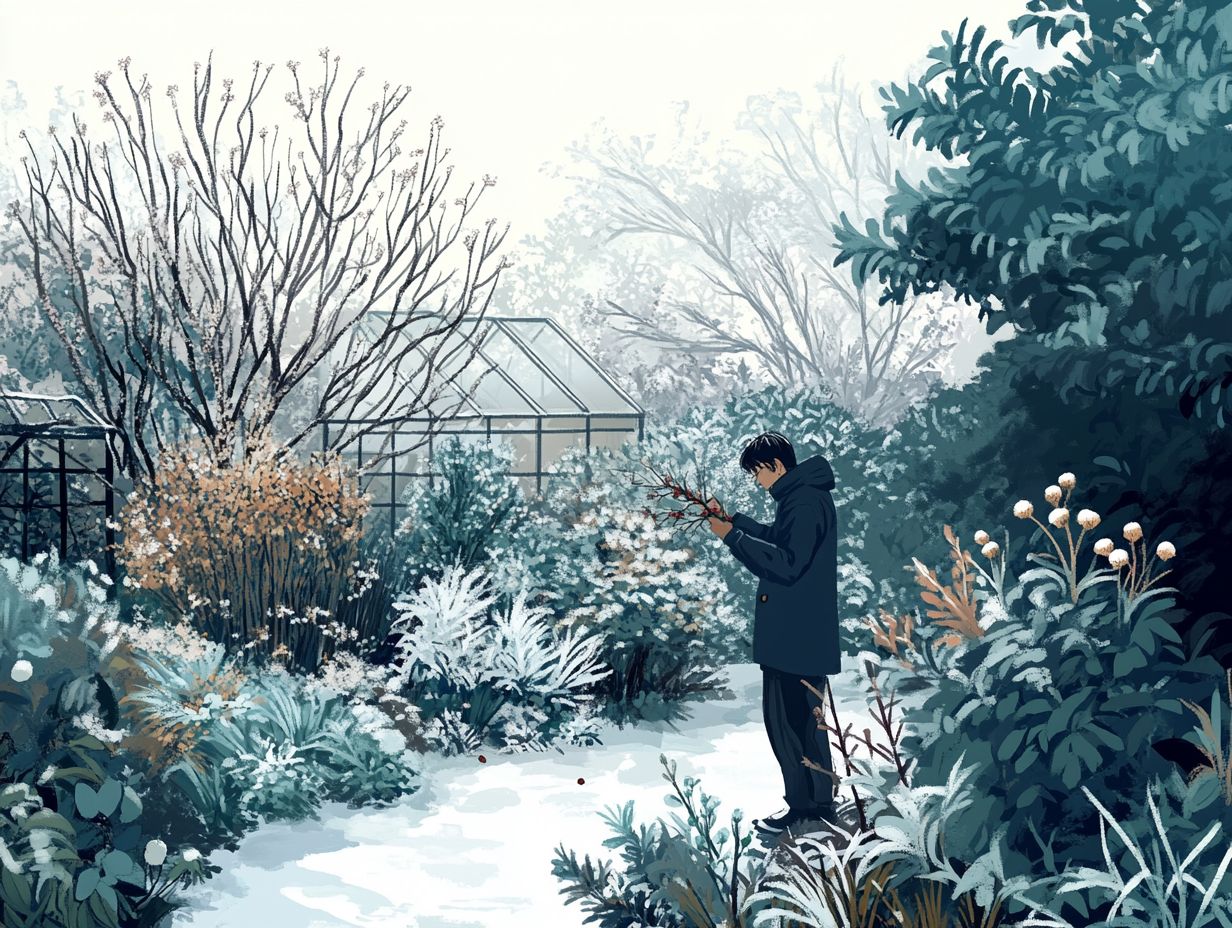
Preventing insect infestations in your winter garden requires a thoughtful blend of strategies. For effective management, consider learning how to manage weeds in winter gardens, which aims at safeguarding beneficial insects while curbing the threats posed by harmful pests.
Employing techniques such as winter washes can effectively keep pests at bay. Removing weeds helps maintain a healthy ecosystem.
Setting up bird feeding stations can attract birds that naturally manage pest populations. This fosters a sustainable ecosystem within your garden.
Take action now! Implement these strategies to ensure your winter garden thrives.
Effective Strategies and Techniques
Implementing effective strategies for pest control can greatly improve the health and productivity of your winter garden. For example, learning how to protect plants from cold-climate pests and using insect hotels attracts beneficial bugs that support a thriving ecosystem.
These practices deter harmful pests and promote biodiversity. For instance, insect hotels provide shelter for pollinators and helpful insects like ladybugs and bees.
Turning kitchen scraps and garden waste into compost enriches your soil with nutrients. This nurtures stronger plants and a more resilient garden.
Incorporating beneficial weeds like clover adds ground cover and habitat for insects. Embracing these methods helps mitigate pest issues effectively.
Treating Insect Infestations in Winter Gardens
Dealing with insect infestations requires a careful approach. Focus on safe and natural methods that protect helpful insects while addressing pest problems.
Using gentle methods, like natural repellents and beneficial insects, nurtures a healthy winter garden. This ensures beneficial critters continue to thrive.
Safe and Natural Methods
Safe and natural methods for pest control are crucial for your winter garden. These methods protect beneficial insects like ladybugs and bees.
By choosing organic pest control, you help create a healthier ecosystem. These small creatures are essential for pollination and managing pests like aphids.
Using techniques such as neem oil or diatomaceous earth can repel harmful pests without harming beneficial insects. Companion planting also helps ensure your garden stays vibrant.
By creating an environment that welcomes these insects, you integrate pest control into your sustainable gardening practices. Consider using Mosquito Joe for extra protection.
Maintaining a Healthy Winter Garden
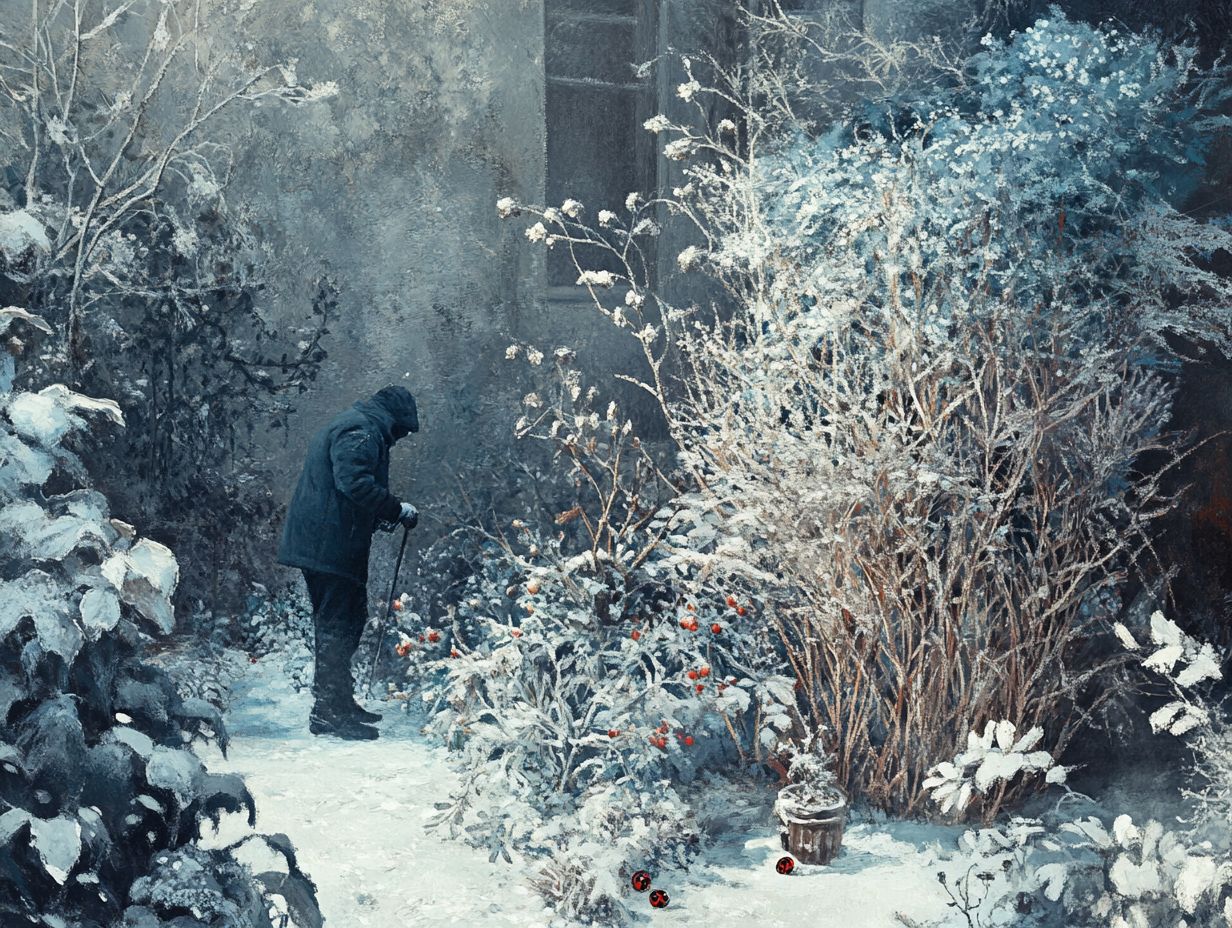
To maintain a thriving winter garden, implement long-term insect control strategies that nurture a healthy ecosystem, along with maintaining moisture levels to ensure optimal growth.
Incorporating practices like composting leaves and setting up bird feeding stations creates a sanctuary for beneficial insects. This keeps your garden vibrant and productive, even during the cold months!
Best Practices for Long-term Insect Control
Implementing best practices for long-term insect control is crucial for cultivating a healthy ecosystem that supports beneficial insects. By embracing strategies such as cultivating weeds that help other plants grow, constructing insect hotels for nesting, and promoting ground nesters, you can significantly enhance the natural balance within your winter garden.
Encouraging a diverse array of plant life not only attracts essential pollinators but also provides natural habitats for various insects that play a key role in pest management. Beneficial weeds serve as a vital food source for predatory bugs while also maintaining soil health. Meanwhile, insect hotels act as cozy refuges where beneficial insects like ladybugs and solitary bees can thrive and reproduce.
Together, these elements create a harmonious environment that keeps harmful pests in check. This allows your ecosystem to flourish and ensures the sustainability of your garden while continuing to support beneficial bugs.
Frequently Asked Questions
How can I prevent insects like aphids and squash bugs from invading my winter garden?
To prevent insects from invading your winter garden, start by cleaning up any debris or dead plants, as insects love to hide in these spots. You can also use a natural pest control method, such as a plant-based insect repellent or laying down a layer of mulch to discourage them from entering.
What are some common insects that invade winter gardens?
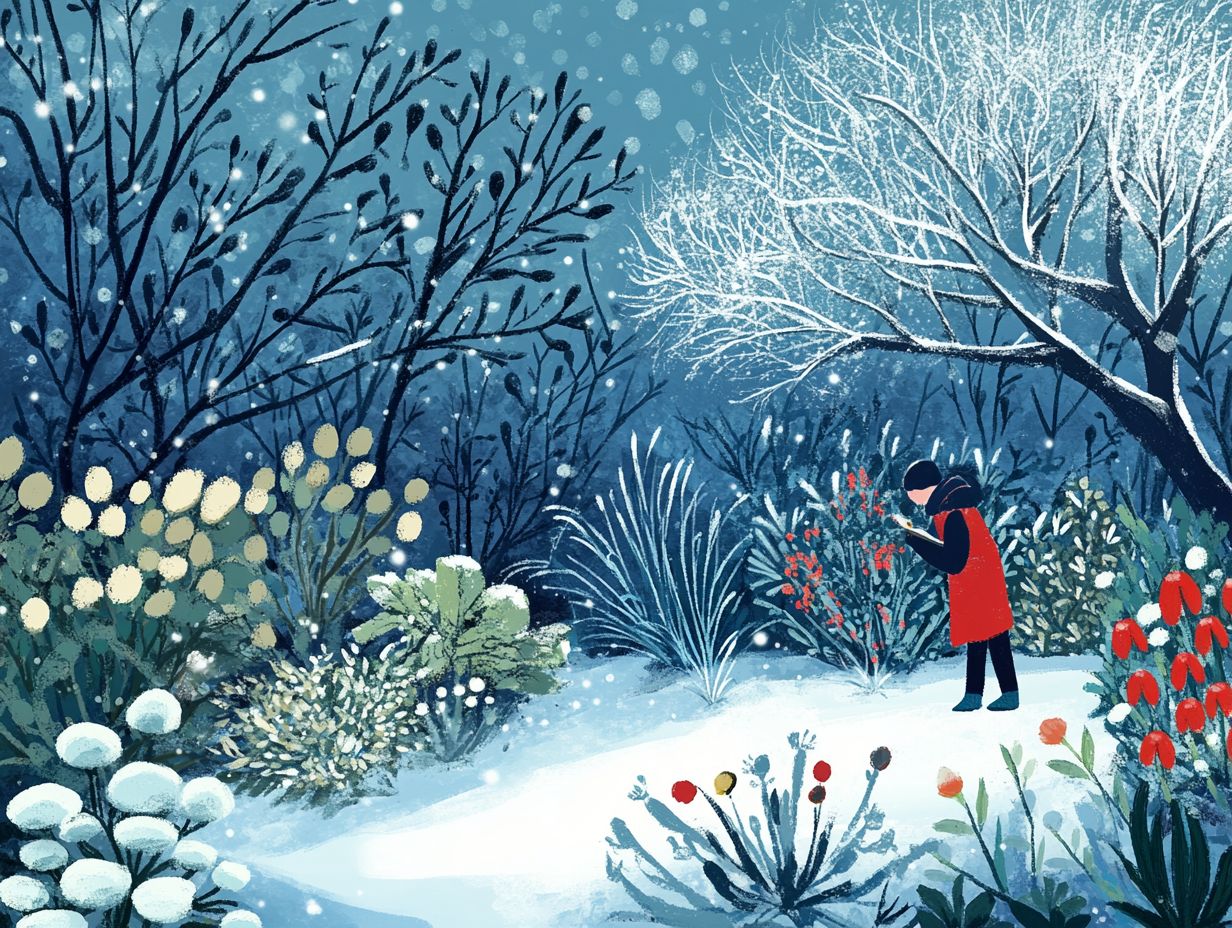
Common insects that can invade winter gardens include aphids, mealybugs, scale insects, and spider mites. These pests are attracted to the warmer temperatures and shelter provided by winter gardens, making it important to understand the role of beneficial insects in winter gardens.
Are there any natural ways to deal with insects in winter gardens?
Yes, there are several natural ways to handle insects in winter gardens. You can introduce beneficial insects like ladybugs or lacewings to prey on harmful pests. Planting companion plants such as marigolds or lavender can also repel insects. Additionally, for more effective strategies, consider preventing indoor pests during winter by using essential oils or homemade remedies like garlic spray to deter them.
How should I handle an insect infestation in my winter garden?
If you notice an insect infestation, act fast to protect your garden! You can manually remove the insects or use a gentle spray of water to wash them off. For severe infestations, grab an organic insecticide to save your plants!
What are some signs of an insect infestation in a winter garden?
Signs of an insect infestation in a winter garden include wilting or curled leaves, discoloration or spots on leaves, stunted growth, or visible insects on plants. You may also notice a decrease in plant health or yield. Regularly inspecting your plants can help you catch an infestation early on.
How can I protect my winter garden from insects?
You can protect your winter garden by practicing good garden hygiene, such as removing debris and keeping the garden clean. Additionally, use physical barriers like row covers or netting to prevent insects from reaching your plants. For more detailed strategies, consider identifying common cold-weather garden pests and introducing beneficial insects or using natural deterrents to help guard your winter garden against insect invasions.
Start implementing these practices today to create a thriving winter garden free from harmful insects, including knowing how to identify fungal pests in winter!


